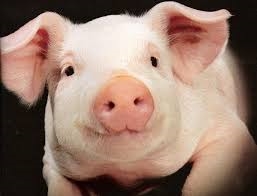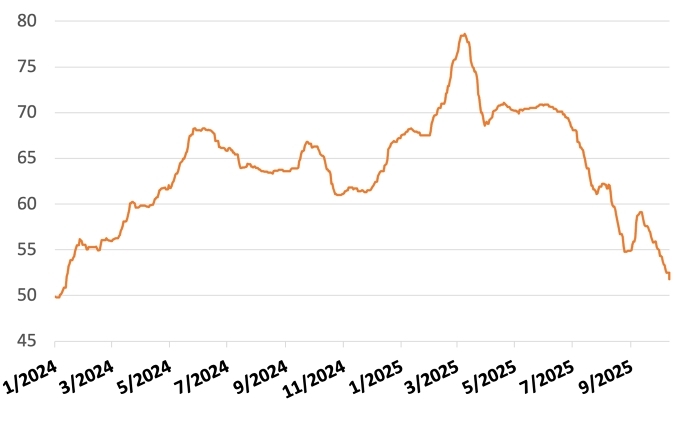Vietnam’s pork market in October 2025
Thursday, October 30,2025
AsemconnectVietnam - Pricing Trends: Live pig prices have shown a slight downward trend throughout October 2025 across all three regions (North, Central, and South). The current price range of 50,000 to 55,000 VND/kg is a decrease from earlier in the year when prices had soared to a three-year high of 70,000-75,000 VND/kg in Q1 2025.
The highest prices were recorded in several northern provinces such as Bac Ninh, Hanoi, and Hung Yen. In the Central and Central Highlands regions, live hog prices ranged from VND50,000 – 53,000/kg, while in the Southern region, the range was narrower at VND50,000 – 52,000/kg.
Trend of live hog prices from January 2024 – October 24, 2025
Unit: thousand VND/kg
Unit: thousand VND/kg

Source: Compiled from Anova Feed
During the past month, Vietnam’s pork import and export activities showed signs of growth.
Disease Situation: ASF remains a significant issue, with over 970 outbreaks reported across 33 provinces in the first seven months of 2025. This has led to the culling of more than 100,000 pigs. The risk of further spread remains high, especially among smallholder farms with lower biosecurity, and illegal transport of diseased pork continues to be a problem.
Export: According to data from AgroMonitor, as of September 16, 2025, Vietnam had exported 840 live pigs to Laos and Cambodia, equivalent to USD640 thousand, up 18% year-on-year. The volume of exported frozen whole pigs, suckling pigs, and young pigs reached 472.17 thousand heads, equivalent to USD44.6 million, up 7.2% compared with the same period last year.
Import: According to preliminary statistics from the General Department of Customs, in the first eight months of 2025, Vietnam imported 102.1 thousand tonnes of chilled or frozen pork, valued at USD274.78 million, up 66.7% in volume and 95.2% in value compared with the same period of 2024. The average import price of chilled or frozen pork during this period stood at USD2,688/tonne, increasing 17.17% year-on-year.
During the first eight months of 2025, Russia remained Vietnam’s largest supplier, accounting for 46.28% of total pork imports; followed by Brazil (32.54%), Canada (4.94%), Spain (4.47%), Germany (2.94%), and Poland (2.73%). Other markets made up 6.11% of the total.
Production and Supply: Despite the disease outbreaks, overall pork production in Vietnam is expected to increase by 3-5% in 2025, reaching over 3.8 million tons. This growth is largely driven by large-scale enterprises with the financial capacity to invest in better biosecurity and modern farming techniques, which are gradually consolidating market share as smaller farms struggle.
Vietnam’s pork production reached 1.34 million tonnes in the third quarter of 2025, up 2 percent year-on-year, according to data from the National Statistics Office.
This marks a modest increase from the second quarter’s 1.33 million tonnes, reflecting stable herd recovery and stronger domestic demand.
In the first nine months of 2025, total pork output reached 4.04 million tonnes, 4.6 percent higher than the same period last year.
The quarterly pace of growth, however, slowed from 6.4 percent in Q2 to 2 percent in Q3, as feed costs remained high and smallholders faced tighter margins.
Pork is Vietnam’s most consumed meat and a central part of the country’s agricultural economy.
Vietnam’s pork industry accounts for roughly two-thirds of total meat production, supported by millions of smallholder farms and an expanding network of commercial producers.
Major production regions include the Red River Delta, Mekong Delta, and southeastern provinces.
Domestic demand is driven by rising incomes and changing diets, while pork imports—from countries like Russia, Brazil, and the US—help stabilise supply during disease outbreaks or price fluctuations.
The industry has faced challenges such as African swine fever, which has severely reduced herds, leading to restructuring and increased biosecurity investment.
Vietnam’s pork sector is gradually modernising through improved genetics, feed efficiency, and large-scale farming operations led by companies such as CP Vietnam and Masan MEATLife.
Vietnam pork output (thousand tons), Q3 2025
|
Category
|
Q2 2025
|
Q3 2025
|
9 months 2025
|
Q2 YoY (%)
|
Q3 YoY (%)
|
9 months YoY (%)
|
|
Pork
|
1,333.8
|
1,339.1
|
4,038.0
|
6.4
|
2.0
|
On the evening of October 22, the Economic Police Division (PC03) under the Hanoi Police Department announced that it had coordinated with relevant agencies to dismantle a criminal ring that illegally purchased, slaughtered, and distributed pork from pigs infected with African swine fever, posing a major health risk to consumers.
According to the investigation, in the early hours of October 14, authorities conducted a surprise inspection and caught red-handed Bui Thi Hoai Phuong (born 1988) and her husband Pham Van Dong (born 1983), residents of Thanh Tri hamlet, Phu Nghia commune, Hanoi, slaughtering and preparing pork suspected to be from diseased pigs.
At the police station, the couple admitted that they had been in the business of buying live pigs, slaughtering them, and selling the meat to local vendors at traditional markets and to several companies that provide meals for factory workers.
Since the beginning of 2025, driven by profit, Phuong and Dong had regularly purchased weak, sick, and even dead pigs from farms in Hanoi and Hoa Binh for around 25,000 VND/kg (approx. 1 USD), while healthy pigs typically sell for 60,000 VND/kg (approx. 2.40 USD).
Authorities searched a meat stall at Xuan Mai Market and the couple’s private residence, where they discovered 837 kg of pork and internal organs emitting a foul odor and suspected to be contaminated with the African swine fever virus.
Further investigation led to Le Phu Hiep (born 1973), a resident of Yen Lac hamlet, Hoa Phu commune, Hanoi, identified as the source of the diseased pigs. A raid on his farm revealed 723 pigs infected with African swine fever, with a combined weight of approximately 60 tons.
Hiep admitted that although he was aware the pigs were infected, he did not report it to authorities out of fear of financial loss. Instead, he secretly sold the pigs to Dong for slaughter and market distribution.
The Hanoi Police Department has filed criminal charges against Pham Van Dong, Bui Thi Hoai Phuong, and Le Phu Hiep. All three have been indicted and are under investigation in accordance with the law.
All 723 infected pigs have been transferred to Hanoi’s Department of Animal Husbandry and Veterinary Services for disposal in order to prevent further disease spread.
PC03 is continuing to expand its investigation to clarify the roles and responsibilities of all individuals involved.
T.Huong
Source: Vitic Vietnamese goods overcome technical barriers, penetrate deeply into New Zealand market
RCEP creates new momentum for small and medium-sized enterprises to integrate internationally
Vietnam’s steel market in October 2025
Main commodity groups exported to New Zealand in first 9 months of 2025
Exports to Laos increased by 79.7% in first 9 months of 2025
Vietnam Fertilizer Market – October 2025
Vietnam’s animal feed market in October 2025: Prices continue to decline
Vietnam's seafood exports to the EU have increased sharply in the first 8 months of 2025 thanks to EVFTA
Exports to Cambodia grew in 9 months of 2025
Dong Nai records nearly 1.4 billion USD in FDI disbursement over 10 months
Import and export surpassed 700 billion USD mark
Vietnam’s coffee exports to the EU surged in the first eight months of the year thanks to the EVFTA
Imports into Vietnam from EVFTA member markets in the first eight months of 2025
EU goods imports into Vietnam in the first eight months of 2025


